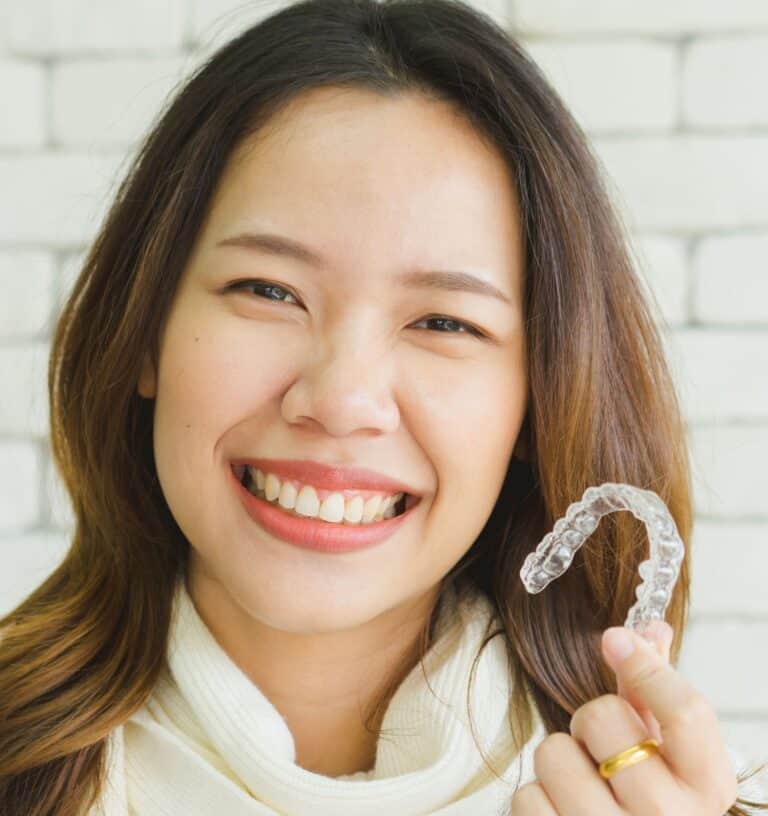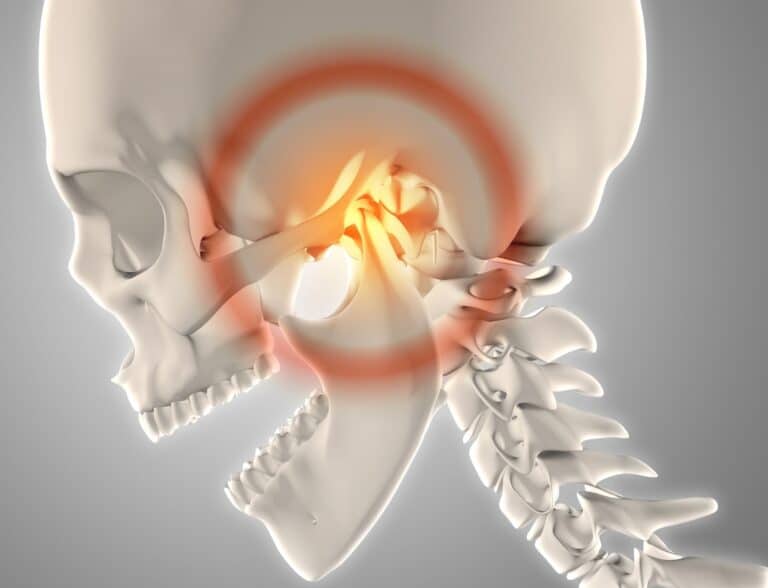A bruxism splint is a custom-made oral appliance that fits snugly over your teeth. It helps reduce pressure on the jaw joints (TMJs) and prevents the upper and lower teeth from grinding or clenching together.
Bruxism splints can also relieve jaw pain, headaches and tooth sensitivity caused by nighttime teeth grinding.

Bruxism often happens during sleep without you even realising it. Over time, it can lead to worn teeth, jaw pain, headaches, and even affect your bite.
Common triggers include stress, anxiety, misaligned teeth or certain medications. The good news is that with early detection and the right treatment, you can prevent long-term damage.
Here are some signs of bruxism:
The temporomandibular joint (TMJ) controls how your jaw moves, and disorders here can make chewing, talking, or even yawning uncomfortable. If you notice clicking, popping or tightness in your jaw, you may have a TMJ disorder.
As always, early attention should relieve discomfort and prevent any further complications.
Common causes of TMD:

Temporomandibular joint (TMJ) issues can start subtly, often going unnoticed until they begin to interfere with daily life. Common signs to watch for include:
At ArtSmiles, we take a customised approach to diagnosing and managing bruxism and TMJ disorders. Every treatment is tailored to your needs and comfort.
Our approach may include:
Our goal is simple: to ease your discomfort, protect your teeth and help your jaw move comfortably again.
Even mild jaw pain or teeth grinding can get worse if left untreated. A consultation with our Southport dental team lets us assess your jaw, bite and teeth, identify the root cause of your symptoms and recommend a personalised treatment plan.
We’ll also answer all your questions in a supportive, pressure-free environment.
Book your consultation today with our friendly team at ArtSmiles Gold Coast.
or call us on (07) 5588-3677
Like any other joint in the body, the TMJ can be fractured, swell and become sore, causing limited movement of the lower jaw and pain radiating to the head and neck area.
A fracture to the actual articular disc is rare, but it can be displaced, causing severe pain and swelling.
Unlike other joints, such as knees and hips, arthritis of the TMJ is very rare and hard to treat with anti-inflammatory drugs alone. Nonetheless, pain in the TMJ is often temporary, and can be treated with a combination of ice tand hen heat to relieve the sore ligaments and muscles surrounding the joint.
Find relief from TMJ disorder today by scheduling an appointment. You can call the office directly, or book your visit using the convenient online tool.
It is believed that up to 70% of the population has some form of TMJ Dysfunction. The Temporomandibular joint provides a wide range of movement and a number of short-term and long-term factors can lead to it becoming misaligned. Many people may only have mild or temporary discomfort.
However, up to 12% of people are known to have ongoing or chronic pain which will only be relieved if the jaw is realigned properly and steps taken to prevent it becoming misaligned in future.
There are several risk factors for TMD: Poor posture in the neck and upper back muscles may lead to neck strain and abnormalities of jaw muscle function. Stress may also increase muscle tension and jaw clenching. The following patients have an increased risk:
TMJ may appear in healthy individuals, but some sensory, psychological and emotional factors put someone at risk of suffering TMJ pain:
Are you aware of grinding or clenching your teeth?
Do you wake up with sore, stiff muscles around your jaws?
Do you have frequent headaches or neck aches?
Does the pain get worse when you clench your teeth?
Does stress make your clenching and pain worse?
Does your jaw click, pop, grate, catch, or lock when you open your mouth?
Is it difficult or painful to open your mouth, eat, or yawn?
Have you ever injured your neck, head, or jaws?
Have you had problems (such as arthritis) with other joints?
Do you have teeth that no longer touch when you bite?
Do your teeth meet differently from time to time?
Is it hard to use your front teeth to bite or tear food?
Are your teeth sensitive, loose, broken or worn?
The more times you answered “yes”, the more likely it is that you have a TMJ disorder. Understanding TMJ disorders will also help you understand how they are treated.
Stress is considered to be a cause of TMJ. Stress can cause many physical symptoms, TMJ pain being one of them. Stress can also cause teeth clenching and grinding, which are known to cause TMJ as well. TMJ, stress, and anxiety may all cause similar symptoms, sometimes making a diagnosis challenging.
Teeth grinding, or bruxing, places pressure on the muscles, tissues and supporting structures of the jaw, causing pain and joint dysfunction.
When you suffer the pain into the jaw or over the chewing muscle on occasion, it may not be a reason for concern. However, you need to see your dentist if the pain is too severe or if it refuses to go away.
Surgical treatment is considered only after all other conservative treatment options have been exhausted.
While TMJ Dysfunction is not life-threatening, it certainly impacts the quality of life. Persistent headaches and jaw, neck or ear pain can disrupt daily life and turn people towards pain relieving medication which has further health complications. TMJ can also be a leading indicator that you are stressed or grind your teeth. Getting on top of these issues early will prevent further health complications.

Dr. Cristian Dunker has helped countless grateful TMJ patients by diagnosing and treating issues with the joints and the bite. Through cutting-edge techniques and latest Diagnostic and Treatment Technologies, Dr. Dunker delivers a TMJ treatment in Gold Coast QLD for patients who are suffering from discomfort or pain to help resolve the condition.
He is committed to providing each of his patients with the highest care and best treatment therapy. His goal is to help patients achieve a healthier smile and overall oral health through individualised, affordable, pain-free and gentle treatment.